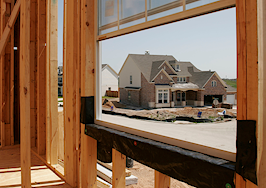Inman Connect New York delivers the perfect blend of outside-the-box thinkers, cutting-edge leaders, and hard-working, successful agents. Join us Jan. 24-26 for crucial content, education, and networking opportunities to help you thrive in today’s changing market. Register here.
Housing may remain unaffordable for many Americans for the foreseeable future, even if the economy contracts next year as more economists now expect.
The tug of war between the high housing costs of today’s market and the lower incomes forecasted in a typical recession scenario may put downward pressure on home prices in the short term. But it’s not expected to address the shortage of new housing development on its own, according to a survey of real estate experts for Emerging Trends in Real Estate 2023.
The report, a joint project by the Urban Land Institute and PricewaterhouseCoopers, explores the opportunities and challenges on the horizon for residential and commercial real estate investors.
“A lot of the homebuilders, when the Great Recession happened, were stuck with inventory, [and] said, ‘We’re not doing that again. We’re going to build 10 new units, and as they sell, we’ll start the next one, etc.,’ ” a former developer and current investment institute head said in the report.
But even as builders shy increasingly away from construction of new homes for sale, they are finding opportunities to build homes in bulk for rental operators, the report found.
And a recent strong wave of interest from investors in multifamily construction could help close the gap between the housing that’s needed and the units that are available, the report suggests.
Commercial property owners may also get increasingly involved in the residential world.
At the Urban Land Institute’s fall meeting Thursday, Andy Warren, director of real estate research for PwC, said that underutilized office space could be converted to more housing, and be part of the solution.
“There’s opportunities out there, and we have needs,” Warren told the audience. “We need affordable, attainable housing. Maybe you turn an office or hotel into [a residential project].”
This is easier to say in theory than it is to put into practice, Warren said. But some property owners are already finding ways to overcome these hurdles, the report says. And other people interviewed for the report said the challenges ahead will present opportunities for real estate investors and practitioners alike.
Here are some of the observations from the latest Emerging Trends report.
Recession: How bad could it be for real estate?
A growing number of economists now expect the U.S. economy to enter a recession, which could spell pain for the housing market.
But few expect that recession to be anywhere near as bad as the one that hit in the aftermath of the housing crisis of 2007.
Merely a quarter of economists surveyed in August by the National Association of Business Economics were at least “somewhat” confident that the Fed could thread the needle, reining inflation back into its target range without triggering a recession.
For real estate, a recession would mean lower demand for rentals even as higher rates make developing or acquiring properties more expensive for investors.
“The existential risk for the real estate economy right now is that Fed action in response to persistent inflation will tip us into a recession,” a senior partner with an advisory firm said in the report.
But even if a recession were to have significant effects on the real estate industry, those interviewed for Emerging Trends said they expect the overall effect on the economy at large would be brief and shallow compared to other recessions in recent years.
Mary Ludgin, head of global research for Heitman, said professionals in the real estate space should recall that recessions present opportunities for investors. Those who have yet to navigate a recession professionally can benefit by talking with someone else who has, she told an audience Thursday at the Urban Land Institute meeting.
“There’s great horror, and there’s great opportunity,” Ludgin said.
Has the COVID-19 pandemic changed home construction for good?
As builders adjust to a fall in buyer demand for new homes, more are turning to build-for-rent projects as a way to hedge their bets, according to the report.
A number of builders who spoke with Emerging Trends interviewers say they are receiving multiple calls a day from single-family rental operators who are interested in building homes for the express purpose of renting them out, not selling them.
The result? Almost half of all master-planned communities now have a build-to-rent section, the report says.
As this segment of the industry grows, it’s possible that homes built as rentals could increasingly come into competition with for-sale homes. This could have an effect similar to what’s already happening in the resale market, one housing adviser pointed out in the report, as institutional investors drive up prices to win offers over families who wish to use a home as a primary residence.
But the report points out positive implications for affordability as well. Build-to-rent projects provide an opportunity for builders to construct hundreds of homes at once, without individual options selected by a disparate group of buyers. This could create opportunities to build faster and more cleanly, bringing down the cost of construction and improving affordability of the final product, the report suggests.
The rise of remote and hybrid work arrangements has also changed what many people want their new homes to look like, and builders are taking note.
Homebuyers in recent years have been more likely to want an extra bedroom for a home office, plus more flexible spaces where they can work around the house, according to builders interviewed for Emerging Trends.
And some of these buyer preferences appear to be here to stay.
Builders, for their part, had little time to create new layout plans amid the rush of home demand for new homes earlier in the COVID-19 pandemic. But they did make many modifications to existing plans, such as reducing the size of a bedroom that might be used instead as a home office and pulling space from larger common areas to create extra nooks and other functional spaces.
A multifamily boom is underway
Apartment buildings and other multifamily projects have long faced challenges in securing approval from local governments and stiff opposition from local interest groups.
“It’s been virtually impossible to build affordable [housing],” a top executive for an apartment industry trade group said in the report. “You can’t build ground-up affordable because of the price of land, and the regulations that govern that, and everything the [“not in my backyard”] activists rule. … It all puts a real damper on the industry’s ability to produce.”
But recent headwinds suggest that there is widespread investor interest in pushing through these limitations and increasing the supply of multifamily housing, the report says.
Demographic shifts are signaling to investors that there is strong demand for multifamily housing and likely will be for years to come. The U.S. is expected to add 1.3 million new households each year through 2035 and those families will need places to live.
The National Multifamily Housing Council and the National Apartment Association say the U.S. will need to build 331,000 new apartments each year to cover the gap — an expansion of 20 percent over the next decade.
The difficulties of accomplishing this are real, the report suggests, but there are also signs it could be plausible.
Investors are already pouring resources into multifamily construction, which has remained strong even as the single-family side of the industry has contracted. Industry voices who spoke for Emerging Trends expect fundamental demand for rental units may be strong for the foreseeable future.
A potential recession can be a scary environment to navigate. But it can also provide great buying opportunities for well-positioned investors, Crow Holdings CEO Michael Levy said Thursday at Urban Land Institute’s fall meeting.
“Be prepared, and be liquid,” Levy told the audience. “Be prepared for anything in your business, and be liquid to capitalize on it, if you can be.”













